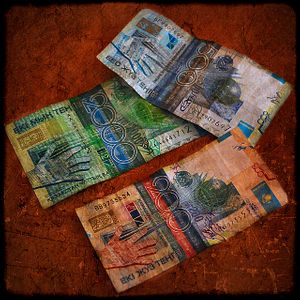A Moldovan businessman once invested money in Kazakhstan’s oil sector, but unproductive fields and heavy-handed bureaucracies led the venture to failure.
This could be the blueprint of every unsuccessful oil story in Kazakhstan and many of its neighbors. Something must have gone horribly wrong for Kazakhstan, however, because the ensuing lawsuits have now pushed Bank of New York Mellon to freeze $22.6 billion in assets held by Kazakhstan’s National Fund, causing a major headache to the gatekeepers of the country’s budget and oil resources.
Kazakhstan’s assets were frozen after companies owned by Anatol Stati won lawsuits against the government, which seized their petroleum operations in the Borankol and Tolkyn fields in 2010. The sum that Bank of New York Mellon froze in October – Reuters first reported this at the end of December – amounts to roughly 40 percent of Kazakhstan’s National Fund.
The frozen assets could now become currency for Kazakhstan to pay up on a $520 million international arbitration award that the country lost to Stati and his partners at the Stockholm Chamber of Commerce in December 2013 for violating the Energy Charter Treaty. Kazakhstan refused to pay and filed lawsuits in the United States against the Moldovan side. Last year, Anatol Stati, his son Gabriel, and their companies Ascom Group S.A. and Terra Raf Trans Trading Ltd. tried to enforce the payment via Belgian and Dutch courts, which led to Bank of New York Mellon’s decision to freeze Kazakhstan’s assets.
After the announcement of the freeze, the Kazakh government filed a lawsuit against Bank of New York Mellon, the custodian of Kazakhstan’s National Fund assets, although a court in London dismissed the case shortly thereafter.
Kazakhstan’s Ministry of Justice showed confidence that it would not risk paying any more than the 2013 arbitration award.
“In any case, the risks to the Republic of Kazakhstan are limited by the arbitration award – $497,658,101 plus interest … and half of Stati’s legal fees,” Reuters reported the ministry as saying.
And yet the scale of the freeze surprised most observers.
“It’s pretty unprecedented,” Simon Quijano-Evans, an investment strategist at Legal & General Investment Management in London told Reuters. “If 40 percent of a sovereign fund is frozen and you don’t have access to it, that should be an alarm bell for policymakers.”
In fact, the new year brought new headaches for the government. The Moldovan side said it will seek the foreclosure of Kazakhstan’s $5.2 billion stake in the consortium developing the giant Kashagan oil field off the coast of the Caspian. A Dutch court froze the stake. The government reacted by saying that the decision will not impact the day-to-day operations in the field, save for potential dividend payments to Samruk-Kazyna, the holding managing the National Fund and the Kashagan stake (through the Netherlands-registered KMG Kashagan BV).
This represents a huge blow to Kazakhstan’s finances, given that, on January 5, the Amsterdam District Court recognized that both Samruk-Kazyna and Kazmunaigas, the Samruk-Kazyna subsidiary in charge of the country’s oil and gas operations, ultimately represent the government.
Moving across several jurisdictions, the Moldovan side also managed to sue elsewhere for other Kazakhstan-owned assets, such as a stake in Luxembourg-registered Eurasian Resources Group mining company and stakes in around three dozen companies registered in Sweden worth around $100 million in total.
The Ministry of Justice published the government’s side of the story, stating it is seeking to reverse the arbitration award and that it has filed a lawsuit for fraud concerning the Moldovan side’s investments in the country.
While the outcome of the dispute will remain uncertain until further court decisions sway the fate of Kazakhstan’s assets, the origin of the dispute has precise coordinates.
In 2008, Stati had a falling out with Vladimir Voronin, then-president of Moldova, who warned Kazakh President Nursultan Nazarbayev in a letter. The letter denounced Stati as a shady businessman with loose ties to Moldova and a penchant for hiding profits offshore. In 2009, Stati’s son Gabriel was accused of financing the April riots in Chisinau, Moldova. Months later, the Kazakh authorities started investigating the Stati family’s dealings in Kazakhstan, which ultimately led the family to leave its business Kazakhstan a year later.
The Moldovans, however, did not leave quietly and are now on track to recover the funds they invested in Kazakhstan. Should this continue into a longer legal battle, with Kazakhstan possibly forced to sell – entirely or partially – its stake in Kashagan, it could turn into a nightmare for the government.













